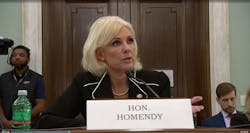NTSB Wants Workers to Feel Safe Reporting Aviation Safety Concerns
Employees may be afraid to speak up and report safety concerns.
That was one of the topics discussed at the March 6 Senate Committee on Commerce, Science, and Transportation Hearing: “National Transportation Safety Board Investigations Reports.”
National Transportation Safety Board Chair Jennifer Homendy gave an update on the NTSB's investigation following a Jan. 5 incident in which a door plug dislodged from the Boeing 737 MAX 9 at roughly 16,000 feet and several passengers sustained injuries.
U.S. Sen. Maria Cantwell, D-Washington, who chairs the committee, pointed to the Feb. 26 FAA expert panel review’s final report on the safety management processes and effectiveness of Boeing Commercial Airplanes.
The expert panel learned managers authorized to oversee performance evaluations, salary decisions, promotions and disciplinary actions might also be tasked with investigative duties in the safety management system (SMS) framework. "This arrangement could lead to a manager investigating a report within their own reporting chain, potentially compromising Boeing’s commitment to a non-retaliatory and impartial environment," the report said. "This dual responsibility and authority create, among some employees, hesitation in reporting safety concerns for fear of retaliation."
The recommendation from the panel to Boeing is to create an investigation process that is sufficiently autonomous to ensure confidence in non-retaliatory measures.
Cantwell, concerned that Boeing employees may be afraid to speak up and report safety issues, said there is a way to speak directly to the FAA, then asked, “Is there a way for people to speak directly to NTSB to aid in this investigation?”
"Yes, in fact, I received a whistleblower report myself,” Homendy replied, adding that anonymously NTSB had received information and she made sure the investigation team received that information.
According to Homendy, the best way to contact the NTSB is [email protected].
Cantwell asked Homendy if she had concerns about how an investigation of Boeing by Department of Justice would impact the NTSB’s investigation.
Homendy replied, “… Where it becomes a concern for us is when employees and others don't feel safe to speak to us."
Cantwell: "Well, that is occurring now. And so, what do we need to do to make sure that people feel safe and secure? That's part of the expert report. It's part of why we passed ACSSA [Aircraft Certification, Safety, and Accountability Act] to make sure there was no retaliation. What else can we do?
"And we can't have a viewpoint that, ‘I just had to keep the line moving.’ That's not the viewpoint we want. We want employees who are saying, ‘I have a concern about this,’ to be listened to, and to be backed up by those FAA ASIs [aviation safety inspectors]. That's what we want. And so, in this case, we want to understand whether that kind of retaliation still exists, and what we can do to make sure that these people feel free to speak to you, and to others who are investigating."
Homendy: "I completely agree with that."
"The aviation industry is so safe because we do encourage, the industry has encouraged, anonymous reporting, and through anonymous reporting addressed risk proactively and encouraged employees to speak up. That's how we have addressed safety and gotten to our excellent gold standard safety record we are in today in the aviation industry. Without that, there is a significant concern.
"I am aware of the concerns with Boeing, which is why we are delving into safety culture and safety management."
Also Read: Sen. Cantwell to Boeing: Where Are the Documents?
About the Author
Rebecca Kanable
Assistant Editor
Rebecca Kanable, a veteran journalist, worked with Endeavor Business Media's aviation group from 2021 to 2024 as assistant editor of Airport Business, AMT and Ground Support Worldwide. She previously worked for various publications, including trade magazines and newspapers.

